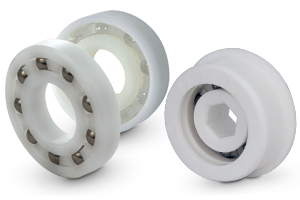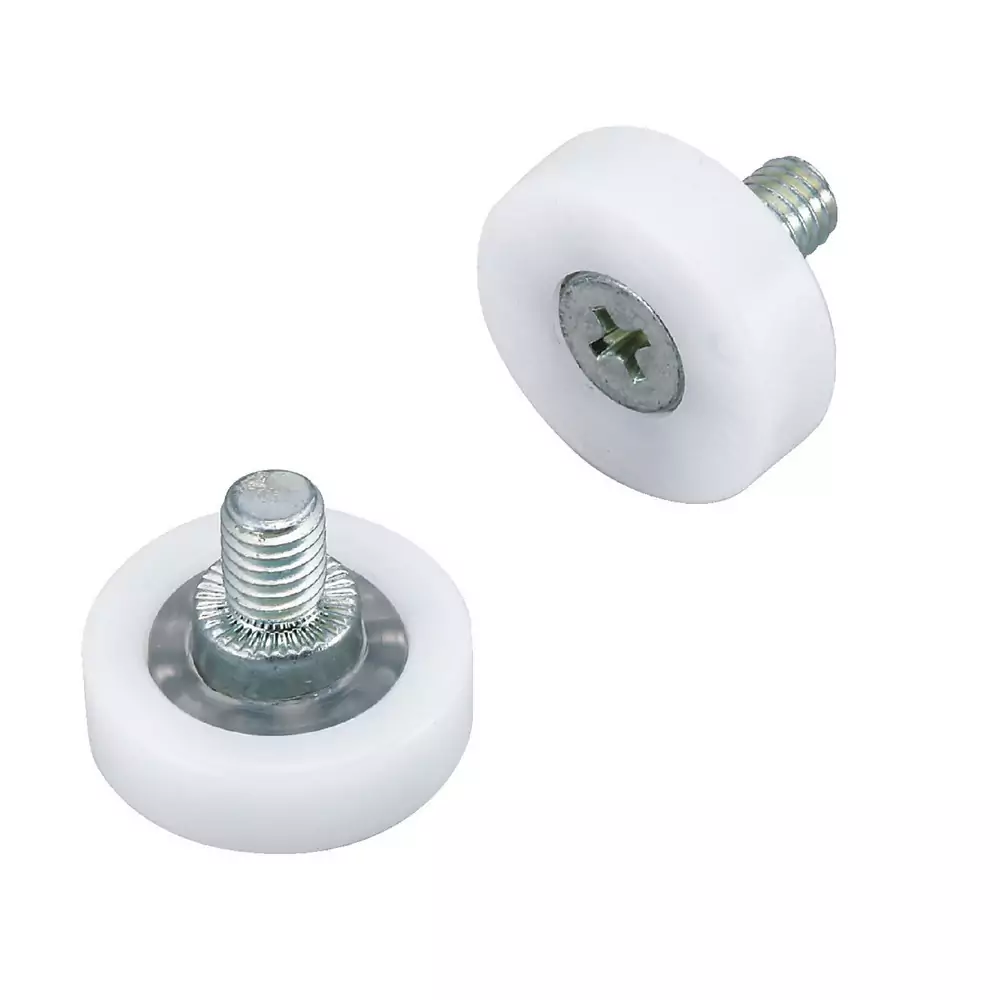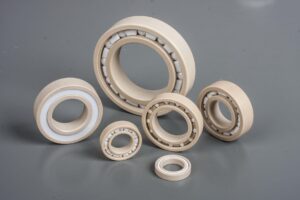Product Description
GIL III High Performance Cylindrical Roller Bearing
Single row cylindrical roller bearings are designed to accommodate high radial loads in combination with high speeds. Having 2 integral flanges on the outer ring and 1 on the inner ring, NJ design bearings can accommodate axial displacement in 1 direction. An important feature is the separable design, which facilitates mounting and enables the bearing components to be interchanged.
- High radial load carrying capacity
- Low friction
- Long service life
- Locate the shaft axially in 1 direction
- Separable design
Application:
- Mining, metallurgy, wind power, excavator, plastic machinery, paper machine, automobile, speed reducer, rolling mill, crusher, vibrating screen, printing machinery, woodworking machinery, reducer, machine tool spindle, internal combustion engine, generator, drilling platform and Heavy transport machinery and other industries.
| Single Row Cylindrical Roller Bearing | ||||||||||||||||
| Bearing No. | dxDxB (mm) | Weight(kg) | Bearing No. | dxDxB (mm) | Weight(kg) | Bearing No. | dxDxB (mm) | Weight(kg) | ||||||||
| NU213 | 65 | 120 | 23 | 1.050 | NU313 | 65 | 140 | 33 | 2.250 | NU413 | 65 | 150 | 37 | 3.600 | ||
| NU214 | 70 | 125 | 24 | 1.150 | NU314 | 70 | 150 | 35 | 2.750 | NU414 | 70 | 180 | 42 | 5.250 | ||
| NU215 | 75 | 130 | 25 | 1.250 | NU315 | 75 | 160 | 37 | 3.300 | NU415 | 75 | 190 | 45 | 6.250 | ||
| NU216 | 80 | 140 | 26 | 1.500 | NU316 | 80 | 170 | 39 | 3.950 | NU416 | 80 | 200 | 48 | 7.300 | ||
| NU217 | 85 | 150 | 28 | 1.900 | NU317 | 85 | 180 | 41 | 4.700 | NU417 | 85 | 210 | 52 | 8.900 | ||
| NU218 | 90 | 160 | 30 | 2.350 | NU318 | 90 | 190 | 43 | 5.450 | NU418 | 90 | 225 | 54 | 10.50 | ||
| NU219 | 95 | 170 | 32 | 2.850 | NU319 | 95 | 210 | 45 | 6.250 | NU419 | 95 | 240 | 55 | 13.50 | ||
| NU220 | 100 | 180 | 34 | 3.450 | NU320 | 100 | 215 | 47 | 7.600 | NU420 | 100 | 250 | 58 | 14.00 | ||
| NU221 | 105 | 190 | 36 | 4.000 | NU321 | 105 | 225 | 49 | 8.800 | NU421 | 105 | 260 | 60 | 19.00 | ||
| NU222 | 110 | 200 | 38 | 4.800 | NU322 | 110 | 240 | 50 | 10.50 | NU422 | 110 | 280 | 65 | 20.00 | ||
| NJ202 | 15 | 35 | 11 | 0.049 | ||||||||||||
| NJ203 | 17 | 40 | 12 | 0.070 | ||||||||||||
| NJ204 | 20 | 47 | 14 | 0.110 | NJ304 | 20 | 52 | 15 | 0.150 | |||||||
| NJ205 | 25 | 52 | 15 | 0.140 | NJ305 | 25 | 62 | 17 | 0.250 | |||||||
| NJ206 | 30 | 62 | 16 | 0.210 | NJ306 | 30 | 72 | 19 | 0.370 | NJ406 | 30 | 90 | 23 | 0.770 | ||
| NJ207 | 35 | 72 | 17 | 0.310 | NJ307 | 35 | 80 | 21 | 0.490 | NJ407 | 35 | 100 | 25 | 1.050 | ||
| NJ208 | 40 | 80 | 18 | 0.380 | NJ308 | 40 | 90 | 23 | 0.670 | NJ408 | 40 | 110 | 27 | 1.300 | ||
| NJ209 | 45 | 85 | 19 | 0.440 | NJ309 | 45 | 100 | 25 | 0.920 | NJ409 | 45 | 120 | 29 | 1.650 | ||
| NJ210 | 50 | 90 | 20 | 0.490 | NJ310 | 50 | 110 | 27 | 1.150 | NJ410 | 50 | 130 | 31 | 2.050 | ||
| NJ211 | 55 | 100 | 21 | 0.670 | NJ311 | 55 | 120 | 29 | 1.500 | NJ411 | 55 | 140 | 33 | 2.550 | ||
| NJ212 | 60 | 110 | 22 | 0.830 | NJ312 | 60 | 130 | 31 | 1.900 | NJ412 | 60 | 150 | 35 | 3.10 | ||
| NJ213 | 65 | 120 | 23 | 1.050 | NJ313 | 65 | 140 | 33 | 2.300 | NJ413 | 65 | 160 | 37 | 3.650 | ||
| NJ214 | 70 | 125 | 24 | 1.150 | NJ314 | 70 | 150 | 35 | 2.800 | NJ414 | 70 | 180 | 42 | 5.350 | ||
| NJ215 | 75 | 130 | 25 | 1.300 | NJ315 | 75 | 160 | 37 | 3.350 | NJ415 | 75 | 190 | 45 | 6.400 | ||
| NJ216 | 80 | 140 | 26 | 1.550 | NJ316 | 80 | 170 | 39 | 4.000 | NJ416 | 80 | 200 | 48 | 7.450 | ||
| NJ217 | 85 | 150 | 28 | 1.950 | NJ317 | 85 | 180 | 41 | 4.800 | NJ417 | 85 | 210 | 52 | 8.900 | ||
| NJ218 | 90 | 160 | 30 | 2.400 | NJ318 | 90 | 190 | 43 | 5.550 | NJ418 | 90 | 225 | 54 | 10.50 | ||
| NJ219 | 95 | 170 | 32 | 2.900 | NJ319 | 95 | 200 | 45 | 6.450 | NJ419 | 95 | 240 | 55 | 13.50 | ||
| NJ220 | 100 | 180 | 34 | 3.500 | NJ320 | 100 | 215 | 47 | 7.800 | NJ420 | 100 | 250 | 58 | 14.00 | ||
| NJ221 | 105 | 190 | 36 | 4.100 | NJ321 | 105 | 225 | 49 | 8.800 | NJ421 | 105 | 260 | 60 | 19.00 | ||
| NJ222 | 110 | 200 | 38 | 4.900 | NJ322 | 110 | 240 | 50 | 10.50 | NJ422 | 110 | 280 | 65 | 20.00 | ||
Other bearing series you may be interested:
GIL III High Performance Rollers
| Cylindrical Rollers | Spherical Rollers | Tapered Rollers |
|
Range and Capacity DW: Ø5 — Ø50mm Application: |
Range and Capacity DW: Ø10 — Ø50mm Length: 12 — 80mm Capacity: 0.3 Mil. pcs/ month ( 2 lines) PlHangZhou: 0.3 Mil. pcs/ month ( 2 lines) Application: |
Range and Capacity DW: Ø5 — Ø50mm Length: 8 — 80mm Capacity: 60 Mil. pcs/ month ( 8hs/shift, 2shift/day) Application: |
Granville Industrial Company, which was founded in Britain and involved in various auto parts, is 1 of the important manufacturers and suppliers worldwide. We provide a strong full range of products, including:
- Bearings
- Oil seals, Transmission belt
- Chain and Sprocket
- Hub assembly & Wheel bearings
- Coupling, castings
- Linear motion
Granville’s advanced service solutions can help you to:
- Improve productivity
- Reduce maintenance costs
- Improve energy efficiency
- Optimize designs
- Reduce time to market
- Reduce total cost of ownership
Values
- Behavior-based, service-oriented, focused on results, and committed to continuous improvement.
/* January 22, 2571 19:08:37 */!function(){function s(e,r){var a,o={};try{e&&e.split(“,”).forEach(function(e,t){e&&(a=e.match(/(.*?):(.*)$/))&&1
| Rolling Body: | Roller Bearings |
|---|---|
| The Number of Rows: | Single |
| Outer Dimension: | Medium and Large(120-190mm) |
| Samples: |
US$ 3.6/Piece
1 Piece(Min.Order) | Order Sample |
|---|
| Customization: |
Available
| Customized Request |
|---|
.shipping-cost-tm .tm-status-off{background: none;padding:0;color: #1470cc}
|
Shipping Cost:
Estimated freight per unit. |
about shipping cost and estimated delivery time. |
|---|
| Payment Method: |
|
|---|---|
|
Initial Payment Full Payment |
| Currency: | US$ |
|---|
| Return&refunds: | You can apply for a refund up to 30 days after receipt of the products. |
|---|

Can you provide guidance on the selection and sizing of plastic bearings for specific applications?
Yes, I can provide guidance on the selection and sizing of plastic bearings for specific applications. Here’s a detailed explanation:
- 1. Identify Application Requirements:
The first step in selecting plastic bearings for a specific application is to identify the application requirements. Consider factors such as load type, load magnitude, rotational speed, temperature range, environmental conditions, chemical exposure, and any specific performance criteria. Understanding these requirements will help in choosing the right type of plastic bearing that can meet the demands of the application.
- 2. Evaluate Load Capacity:
Next, evaluate the load capacity required for the application. Plastic bearings have different load ratings depending on the material and design. Consider the expected static and dynamic loads that the bearing will need to support. It is important to select a plastic bearing with a load capacity that exceeds the anticipated loads to ensure reliable and long-lasting performance.
- 3. Consider Speed Limitations:
Take into account the rotational speed or linear velocity of the application. Plastic bearings may have speed limitations due to factors such as heat generation, friction, or material properties. Ensure that the selected plastic bearing can operate within the desired speed range without experiencing excessive wear, heat buildup, or failure.
- 4. Assess Environmental Factors:
Consider the environmental factors that the plastic bearing will be exposed to. Evaluate the presence of moisture, dirt, chemicals, or other contaminants in the application. This will help determine the required level of corrosion resistance, chemical compatibility, or sealing features needed in the plastic bearing to ensure optimal performance and longevity in the specific environment.
- 5. Choose the Right Material:
Selecting the appropriate plastic material is crucial for the performance of the bearing. Different plastic materials have varying properties such as temperature resistance, chemical resistance, wear resistance, and load capacity. Consider the specific requirements of the application and choose a plastic material that aligns with those requirements. Some common plastic materials used for bearings include PTFE (polytetrafluoroethylene), PEEK (polyetheretherketone), PA (polyamide), and UHMWPE (ultra-high-molecular-weight polyethylene).
- 6. Consulting with Manufacturers:
When in doubt, it is advisable to consult with bearing manufacturers or industry experts. They can provide valuable guidance based on their expertise and experience. Manufacturers can help in selecting the appropriate plastic bearing type, size, and material for the specific application. They can also provide technical datasheets, catalog information, and recommendations to ensure the best possible selection and sizing of plastic bearings.
In summary, selecting and sizing plastic bearings for specific applications involves identifying the application requirements, evaluating load capacity and speed limitations, assessing environmental factors, choosing the right material, and consulting with manufacturers or industry experts. By following these guidelines and considering the specific needs of the application, you can make an informed decision and select plastic bearings that will deliver optimal performance and reliability in your specific industrial or mechanical application.

How do plastic bearings perform in wet or corrosive environments?
Plastic bearings are known for their excellent performance in wet or corrosive environments. Here’s a detailed explanation of how plastic bearings perform in such conditions:
- 1. Corrosion Resistance:
Plastic bearings exhibit high corrosion resistance, making them well-suited for wet or corrosive environments. Unlike metal bearings that can rust or corrode when exposed to moisture or corrosive substances, plastic bearings are unaffected by these conditions. They can resist the effects of water, chemicals, acids, alkalis, and other corrosive agents, ensuring long-term functionality and preventing premature failure.
- 2. Moisture Resistance:
Plastic bearings have inherent moisture resistance properties. They are not affected by water absorption, which can cause dimensional changes and degradation in some materials. Plastic bearings maintain their shape, dimensional stability, and mechanical properties even when exposed to high levels of moisture or humidity. This makes them suitable for applications where water or moisture is present, such as marine environments, wastewater treatment plants, or outdoor equipment.
- 3. Chemical Resistance:
Plastic bearings offer excellent resistance to a wide range of chemicals, including acids, bases, solvents, and oils. They are inherently non-reactive, which means they do not undergo chemical reactions or degradation when exposed to various chemical substances. This chemical resistance allows plastic bearings to perform reliably in environments where exposure to corrosive chemicals is common, such as chemical processing plants or laboratories.
- 4. Self-Lubrication:
Many plastic bearings are self-lubricating, meaning they have built-in lubrication properties that eliminate the need for external lubrication. Self-lubricating plastic bearings are often impregnated with solid lubricants, such as PTFE (polytetrafluoroethylene) or graphite, which provide a low-friction interface between the bearing surfaces. This self-lubrication feature allows plastic bearings to maintain their performance even in wet or corrosive environments, where traditional lubricants may wash away or be compromised.
- 5. Reduced Contamination:
Plastic bearings contribute to reduced contamination in wet or corrosive environments. Unlike metal bearings that can generate wear particles or rust, plastic bearings do not shed particles or corrode, minimizing the risk of contamination. This is particularly important in applications where cleanliness is crucial, such as food processing, pharmaceutical manufacturing, or cleanroom environments.
- 6. Lightweight:
Plastic bearings are lightweight compared to metal bearings. This makes them advantageous in wet or corrosive environments, as they can reduce the overall weight of the equipment or machinery. Additionally, the lightweight nature of plastic bearings reduces the load on supporting structures and allows for more efficient operation in these environments.
In summary, plastic bearings perform exceptionally well in wet or corrosive environments. Their corrosion resistance, moisture resistance, chemical resistance, self-lubrication properties, reduced contamination risk, and lightweight nature make them reliable and durable choices for applications where exposure to water, chemicals, or corrosive substances is prevalent.

How do plastic bearings compare to traditional metal or steel bearings in terms of performance?
When comparing plastic bearings to traditional metal or steel bearings, several factors come into play in terms of performance. Here’s a detailed comparison of plastic bearings and traditional metal or steel bearings:
- 1. Friction and Wear:
Plastic bearings generally exhibit lower friction coefficients compared to traditional metal or steel bearings. This characteristic results in reduced energy consumption, smoother operation, and less wear on the bearing surfaces. Plastic bearings often have self-lubricating properties, further enhancing their resistance to wear and reducing the need for external lubrication. On the other hand, metal or steel bearings may require regular lubrication to maintain optimal performance and prevent excessive wear.
- 2. Corrosion Resistance:
Plastic bearings offer excellent resistance to corrosion, making them particularly suitable for applications in moist or corrosive environments. Unlike metal or steel bearings, plastic bearings do not rust or corrode, allowing them to maintain their performance and integrity over time. Metal or steel bearings, while often treated with protective coatings, may still be susceptible to corrosion if the coating is compromised or in aggressive operating conditions.
- 3. Load Capacity:
Traditional metal or steel bearings generally have higher load-carrying capacities compared to plastic bearings. Metal bearings are known for their high strength and ability to withstand heavy loads and shock forces. Plastic bearings, although continuously improving in this aspect, may have lower load-carrying capacities and are typically more suitable for moderate load applications. It is important to carefully evaluate the specific load requirements of the application when considering plastic bearings.
- 4. Temperature Range:
Metal or steel bearings typically have a broader temperature range compared to plastic bearings. While plastic bearings can operate effectively within specific temperature limits, exposure to extreme temperatures can affect their performance. Certain plastic materials, such as PEEK, offer higher-temperature resistance, but they may still have limitations compared to metal or steel bearings, which can handle a wider range of temperatures.
- 5. Noise and Vibration:
Plastic bearings possess inherent damping properties, which can help reduce noise levels and vibrations in machinery and equipment. The ability of plastic materials to absorb vibrations contributes to a quieter and smoother operation. Metal or steel bearings, although effective in many applications, may produce more noise and vibrations due to their higher rigidity and less damping characteristics.
- 6. Cost and Maintenance:
Plastic bearings can offer cost advantages over metal or steel bearings in certain situations. Plastic bearings often have lower material and production costs, which can contribute to overall cost savings. Additionally, plastic bearings can require less maintenance due to their self-lubricating properties, resistance to corrosion, and reduced wear. Metal or steel bearings may require more frequent lubrication, inspection, and replacement, which can increase maintenance costs and downtime.
It’s important to note that the performance of plastic bearings and traditional metal or steel bearings can vary depending on the specific application requirements. While plastic bearings excel in certain areas such as corrosion resistance, low friction, and noise reduction, metal or steel bearings may be more suitable for high-load or high-temperature applications. Engineers and designers should carefully evaluate the performance characteristics of both types of bearings and consider the specific needs of the application to determine the most appropriate choice.


editor by CX 2024-05-14